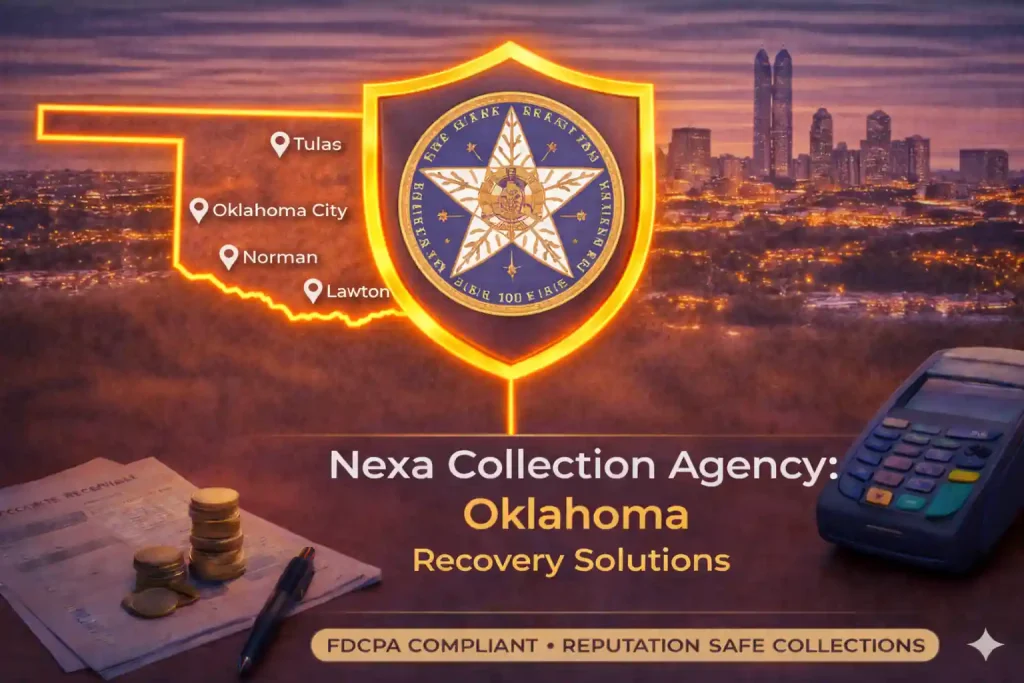In Oklahoma—from the energy corridors of Oklahoma City and the industrial hubs of Tulsa to the medical centers of Norman and Edmond—business is built on a foundation of reliability. But in 2026, reliability isn’t enough; you need speed. With Oklahoma’s 5-year statute of limitations on written contracts, you have a powerful window to recover revenue, but federal changes have effectively ended credit reporting as a “threat” for medical debt. You don’t just need a collector; you need an Oklahoma-licensed strategist who can secure bank levies and property liens to recover what is yours before the clock runs out or federal regulations shield your debtors.
Nexa provides 100% reputation-safe, equipped with all 50-state collections license, offering free credit reporting, free litigation/bankruptcy scrubs, and zero onboarding fees. Secure – SOC 2 Type II & HIPAA compliant.
Need a Collection Agency? Contact us
The Oklahoma Legal Landscape (2026 Summary)
Oklahoma rewards creditors who document their agreements, offering a significant 60-month window for written contracts.
| Debt Category | Statute of Limitations | Oklahoma Statute (12 O.S. § 95) |
| Written Contracts | 5 Years | 12 O.S. § 95(1) |
| Oral / Open Accounts | 3 Years | 12 O.S. § 95(2) |
| Medical Debt | 5 Years | 2026 CFPB Reporting Ban |
| Wage Garnishment | 25% Cap | 31 O.S. § 1.1 |
| Judgments | 5 Years (Renewable) | 12 O.S. § 735 |
Critical Oklahoma Rules for 2026:
-
The 5-Year Advantage: Under 12 O.S. § 95, written contracts (including most B2B invoices and signed credit agreements) have a 5-year window. Nexa audits your 2021–2023 aging reports to find “lost money” that other states would have written off years ago.
-
The 2026 Medical Reporting Ban: Per the latest CFPB rulings effective in 2026, medical bills are no longer allowed on credit reports. Nexa has already pivoted to Judicial Mediation and Bank Levies, ensuring your clinic still gets paid without relying on outdated credit bureau threats.
-
Wage Garnishment Floor: Oklahoma limits garnishment to the lesser of 25% of disposable earnings or the amount by which weekly income exceeds 30x the federal minimum wage ($217.50). We target high-earners to ensure your legal spend is profitable.
-
Construction Lien Deadlines: For those in the trades, Oklahoma is strict. Prime contractors have 4 months, but subcontractors have only 90 days from the last work date to file a lien. Nexa triggers “Step 1” demand letters immediately to trigger payment before these windows close.
Cost-Effectiveness: The Nexa Advantage
-
Fixed-Fee Recovery ($15/account): Best for early-stage and high-volume debt. Debtors pay 100% directly to you.
-
Contingency Service (20%–40%): Performance-based recovery. No Recovery, No Fee.
Industries We Serve in Oklahoma
-
Energy, Oil & Gas: B2B recovery for the Anadarko and Arkoma Basin suppliers. We handle high-value logistics, drilling disputes, and industrial supply recovery in Tulsa and OKC.
-
Healthcare & Medical: 100% HIPAA-compliant. We navigate the 2026 medical reporting ban, using mediation to preserve patient trust while securing payments via bank levies for practices from Lawton to Broken Arrow.
-
Agriculture & Manufacturing: Specialized recovery for equipment dealers and ag-industrial suppliers. We understand the seasonal cycles of the Oklahoma heartland.
-
Colleges & Universities: From OU to OSU, we handle tuition fee recovery and housing balances with a focus on student-first mediation.
-
Accountants & CPA Firms: Recovery of professional service fees. We understand the “net-30” billing cycle and preserve your client rapport through mediation.
-
Banks & Credit Unions: Expert handling of delinquent consumer loans and deficiency balances using Oklahoma’s 5-year judgment renewal window.
-
Construction & Trades: Revenue recovery for HVAC and general contractors (Experts in Title 42 Mechanic’s Liens and 90-day filings).
-
B2B Commercial, Restoration & Waste Management: High-speed recovery for service providers who need cash flow restored immediately to stay competitive.
Recent Oklahoma Recovery Results
Case 1: OKC Regional Medical Specialty Group (Medical)
-
The Problem: $138,000 in aging patient debt. The clinic was losing leverage because credit reporting was no longer an option in 2026.
-
The Result: Nexa implemented a compliant “Judicial Mediation” strategy, recovering $91,000 in 65 days through bank levies and professional settlements.
Case 2: Tulsa-Based Oilfield Logistics Firm (B2B)
-
The Problem: A $64,000 unpaid invoice for heavy equipment transport. The debtor claimed “contractual ambiguity.”
-
The Result: Utilizing Oklahoma’s 5-year written contract statute and a formal pre-legal demand, Nexa secured a full $64,000 recovery plus interest in just 28 days.
Frequently Asked Questions (FAQ)
1. Is it true medical debt isn’t on credit reports in 2026?
Yes. Under new federal regulations, medical debt is banned from credit reports to protect consumer scores. Nexa uses legal judgments and bank attachments to ensure your practice still collects without needing credit reporting leverage.
2. How long do I have to sue for an unpaid invoice in Oklahoma?
For written contracts, you have 5 years. For oral agreements or “open accounts,” the window is 3 years. Nexa provides a free audit to see which of your accounts are approaching these deadlines.
3. Can you garnish wages for B2B debt in Oklahoma?
Yes. Once a judgment is secured, we can garnish up to 25% of disposable income, provided the debtor earns above the protected floor of $217.50/week.
Popular cities:

